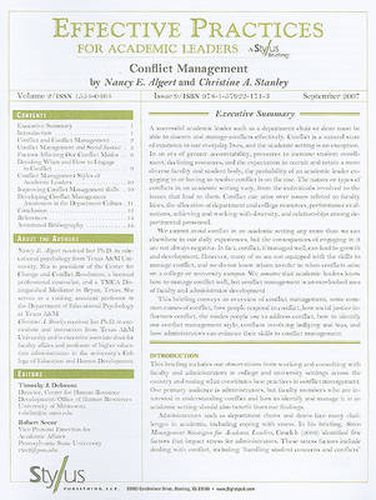Readings Newsletter
Become a Readings Member to make your shopping experience even easier.
Sign in or sign up for free!
You’re not far away from qualifying for FREE standard shipping within Australia
You’ve qualified for FREE standard shipping within Australia
The cart is loading…






A successful academic leader such as a department chair or dean must be able to discern and manage conflicts effectively. Conflict is a natural state of existence in our everyday lives, and the academic setting is no exception. In an era of greater accountability, pressures to increase student enrollment, declining resources, and the expectation to recruit and retain a more diverse faculty and student body, the probability of an academic leader engaging in or having to resolve conflict is on the rise. The nature or types of conflicts in an academic setting vary, from the individuals involved to the issues that lead to them. Conflict can arise over issues related to faculty hires, the allocation of department and college resources, performance evaluations, achieving and working with diversity, and relationships among departmental personnel.
We cannot avoid conflict in an academic setting any more than we can elsewhere in our daily experiences, but the consequences of engaging in it are not always negative. In fact, conflict, if managed well, can lead to growth and development. However, many of us are not equipped with the skills to manage conflict, and we do not know whom to refer to when conflicts arise on a college or university campus. We assume that academic leaders know how to manage conflict well, but conflict management is an overlooked area of faculty and administrator development.
This briefing conveys an overview of conflict management, some common causes of conflict, how people respond to conflict, how social justice influences conflict, the modes people use to address conflict, how to identify our conflict management style, conflicts involving bullying and bias, and how administrators can enhance their skills in conflict management.
$9.00 standard shipping within Australia
FREE standard shipping within Australia for orders over $100.00
Express & International shipping calculated at checkout
A successful academic leader such as a department chair or dean must be able to discern and manage conflicts effectively. Conflict is a natural state of existence in our everyday lives, and the academic setting is no exception. In an era of greater accountability, pressures to increase student enrollment, declining resources, and the expectation to recruit and retain a more diverse faculty and student body, the probability of an academic leader engaging in or having to resolve conflict is on the rise. The nature or types of conflicts in an academic setting vary, from the individuals involved to the issues that lead to them. Conflict can arise over issues related to faculty hires, the allocation of department and college resources, performance evaluations, achieving and working with diversity, and relationships among departmental personnel.
We cannot avoid conflict in an academic setting any more than we can elsewhere in our daily experiences, but the consequences of engaging in it are not always negative. In fact, conflict, if managed well, can lead to growth and development. However, many of us are not equipped with the skills to manage conflict, and we do not know whom to refer to when conflicts arise on a college or university campus. We assume that academic leaders know how to manage conflict well, but conflict management is an overlooked area of faculty and administrator development.
This briefing conveys an overview of conflict management, some common causes of conflict, how people respond to conflict, how social justice influences conflict, the modes people use to address conflict, how to identify our conflict management style, conflicts involving bullying and bias, and how administrators can enhance their skills in conflict management.